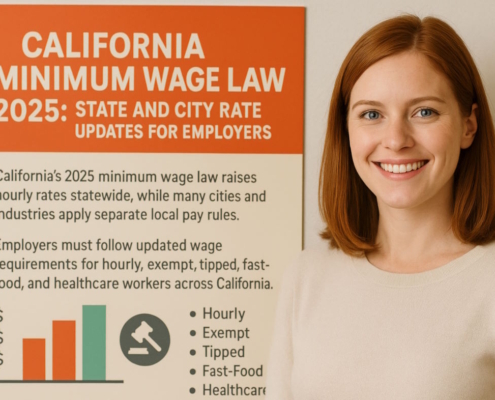Mandatory Job Training and Your Right to Be Paid in California
You show up for work, and the employer requires mandatory job training, such as sexual harassment, computer system, or machine operation. The time you spend training is working time and must be paid. If the training involves sitting in a meeting and listening, that is work time and must be paid. Slavery was abolished, and no workers should attend mandatory work training for free! If the employer does not pay you for mandatory training, you can sue. Mandatory overtime in California is a separate issue from training, but it also requires compensation for hours worked beyond the standard workweek.
If My Employer Refuses to Pay for Mandatory Training, What Should I Do?
All employers that require their workers to attend mandatory training must pay wages for the training. If your employer refuses to pay for mandatory training, you should contact an employment attorney to help you get compensated for attending the mandatory training. Most employment attorneys will work on a contingent basis, meaning they will only be paid if they recover money for you. Laws on paying employees for training are clear: employees must be compensated for time spent in mandatory training.
Under California law, employers are required to pay employees for all hours worked, including mandatory training, even if the employee has not started working officially. If an employer is asking you to attend mandatory training before your official start date, they must pay for that time. If your employer refuses to pay for mandatory training, it is crucial to take action and seek legal advice, as failing to compensate for training hours is illegal.
Illegal Unpaid Training
Unpaid training is one of the oldest tricks in the book for underhanded employers looking to steal time. During those days to weeks of unpaid training, you still have to pay for your bills, meals, gas to get to work and back, and can’t take any other work. This practice is highly illegal. According to California employment law, all time your employer requires you to spend on the job, even if you are not yet “being productive,” absolutely must be paid. Otherwise, your employer is stealing your time and refusing to compensate. Unpaid training before hire is illegal in California unless the training is voluntary or for the benefit of the employee.
Employers often claim that employees in training are not actually working, and therefore they should not be paid. They may try to schedule your training off the clock and call it recreational. They may even try to dock current employees’ normal pay due to mandatory training time. All of these are violations of your employee rights. If an employer schedules training outside regular work hours, employees should still be compensated, as “not getting paid for work I have done” is illegal.
Many employers try to claim that because the staff in training are not working, they should not be paid. They may schedule your training off-the-clock and call it “recreational.” This is illegal, as California law mandates employees are entitled to payment for any training time, regardless of whether the task seems productive. Is unpaid training legal in California? The answer is no—if training is mandatory and job-related, it must be paid.
Mandatory Training Must Be Paid
It is legal for employers to offer career development or training courses. If the courses are optional, then technically they can qualify as a perk, not work time. This is because the training is not considered necessary for job performance. However, training that is considered mandatory for a job to be performed correctly is considered work. It should therefore be compensated. Training required for the performance of essential job duties must be compensated, making unpaid training illegal.
For instance, if an employer asks you to undergo training that helps you perform your daily duties, such as learning a new software or procedure, this time should always be paid. Even if the training occurs outside normal work hours, your employer cannot avoid compensating you for this time. Do you get paid for training hours? Yes, if the training is mandatory and job-related.
Example: Beth is training to be a fry cook at a restaurant. When the restaurant hires her, they tell her she must undergo a weeklong training course on how to prepare food. Because the training is considered essential for Beth to do her job correctly, it qualifies as work. Therefore, Beth should get paid for her training. Do you get paid during training? Yes, mandatory training is compensable, and it is illegal to not pay employees for required job training.
Job-Related Training Must Be Paid
An employer who requires an employee to attend training related to their work duties must pay that employee, regardless of whether the training is held during work hours or off-the-clock. An employee who practices or learns on-the-job skills must be compensated because they are officially working for the employer. Employers are required to pay for job training, especially when it is directly related to the employee’s position.
When training is directly related to the employee’s role, such as attending sessions to improve skills used on the job, this must be compensated. If the training does not enhance or directly relate to the employee’s current job role, then the employer may not be obligated to pay. Can a job not pay you for training? No, not if the training is mandatory and job-related.
Example: Dorian works for a graphic design company. At the start of his employment, Dorian took a mandatory course where he learned how to use the company’s software and did a sample project. For this training, he received compensation consistent with his agreed-upon pay. Six months later, Dorian learns about another training course offered by the company. He would get to learn about how to use a separate art program that he does not use for his daily job but might want to know in the future. His job does not require him to do the training, but Dorian does it so that he can advance his career prospects. When he finishes the course, he asks his employer to be compensated for the two weeks he spent doing the training after-hours. His boss explains that because the training was not related to his position and not required, Dorian does not have the right to payment. If you’re required to undergo training that is unrelated to your job, your employer is not obligated to pay you for the time spent.
Regular or Overtime Work Hours
Regardless of whether an employer assigns an employee to train during work hours or off-the-clock, he must compensate the employee for their time. This means that if an employer tells an employee to go to a mandatory training meeting during the workday, the employee must be paid. Similarly, if an employer asks that an employee attend a training session after work, the employee must be paid overtime. Mandatory overtime in California requires compensation at an overtime rate, in accordance with labor laws.
If training occurs outside regular hours and pushes the employee into overtime, the employer must compensate the worker with overtime pay. An employer cannot escape paying workers simply because training happens outside normal work hours. Unpaid mandatory meetings are not allowed, and training during overtime must be paid according to California law.
Example: Fabio manages a hair salon. He asks his employee, Saoirse, to stay after work to do a training course on cutting children’s hair. Saoirse does the training course. Fabio does not pay Saoirse because he says she did not do any actual work and was off-the-clock anyway. But because Fabio asked Saoirse to do the training, he must pay her overtime. Training outside regular work hours, especially when it results in overtime, must be compensated.
Training That Produces Value for the Employer
Importantly, training that results in a product for the company must always be compensated. An employer cannot receive goods or services of value from unpaid training time. Many employers have gotten in trouble for not paying interviewees for labor provided during demonstrations. Employees that create something of value, which an employer then uses, have had their time stolen. Is training paid? Yes, if the training produces value or work products for the employer, it is required to be compensated.
This can include any work produced during training that directly benefits the employer. For example, if you create a marketing presentation during training, and your employer uses it, the time spent creating that product should be compensated. Companies must pay employees for training that produces value for the business.
Example: Hattie is interviewing for a political think tank. During the interview process, the employer asks her to write an essay examining the economic relationship between Russia and the West. Hattie spends three days writing a well-researched essay, which she then submits to the employer. The employer ends up hiring Hattie, and he then uploads her essay onto the company blog. Hattie is thrilled until she learns that she will not be paid for those three days she spent writing the essay. Under California law, Hattie’s boss is illegally stealing her time. Because unpaid training is illegal, he must pay her for the three days of “training,” or demonstration, since she performed work of value for the company. Unpaid training that results in valuable work products for the company is illegal, and employees must be paid for their time.
Attorney for Unpaid Training
California workers have a right to be paid anytime they are doing what is required of an employer or creating value for the employer. Employers do not get to choose which one they pay for, they do not get to say training is voluntary when it is really mandatory, and they do not get to ask you to create them something for free. Employers are required to pay for all mandatory training under California labor laws.
At our legal firm, we are dedicated to defending employee rights to fair pay and fair treatment. If you or your coworkers have been required to take unpaid training time or asked to create work products for your employers without pay, your rights are being violated, and back-pay is owed. Let us help make your employer change their ways, not just for you, but for every employee they are applying these thieving tactics to now and in the future. Unpaid training is illegal, and legal help is available to ensure you are compensated for your time.































